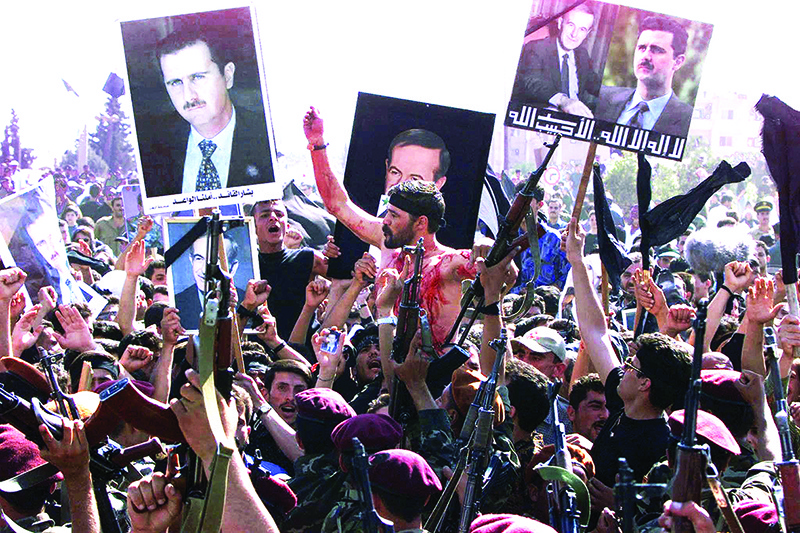

BEIRUT: Bashar Al-Assad’s rise to power after three decades of his father’s iron-fisted rule raised hope of democratic opening. But 20 years later, Syria is isolated and war-ravaged. Crumbling under a stinging economic downturn, Western sanctions and nine years of war, Syria today is a far cry from the vision Assad projected when he was propelled to the presidency a month after his father Hafez died on June 10, 2000.
"There was a good deal of anxiety in the early stages, as Syria hadn’t experienced a peaceful transition of power in decades and Hafez al-Assad was all many people knew,” said Faysal Itani of the Center for Global Policy. But "soon this all subsided as Bashar settled in and projected this aura of modernity, youth, and openness”. Sworn in at the age of 34, the London-trained ophthalmologist exuded the aura of a reformer who could fundamentally alter Syrian politics through economic liberalization and a limited opening to the West. His ascension to the presidency, a year after Jordan and Morocco crowned new kings, added to the impression that a tide of change was sweeping the region.
For a brief period after he was voted in through a single-candidate poll, Syria saw a surge in political debate and activism, after almost 40 years of emergency law. This burst in political activity was inconceivable under the rule of Hafez, whose forces notoriously carried out a 1982 massacre in Hama following an Islamist uprising. "Bashar was a very different character from the other prominent figures in the regime,” said Syria expert Daniel Neep. He was only second in line until his older brother Bassel died in a 1994 car accident. "In a country that had not seen any significant political or economic opening for over a decade, Bashar’s ascension to the presidency appeared to signal the promise of long-overdue reform,” said Neep, assistant professor at Georgetown University.
‘Liberaliser idea died quickly’
In September 2000, around 100 intellectuals called for reforms including the lifting of the state of emergency, public freedoms and political pluralism in what became known as the Damascus Spring. "The idea of Bashar as liberaliser died quite quickly,” Itani said. By the summer of 2001, Assad was cracking down on dissent. The promise of economic liberalisation also faded as wealth fell exclusively in the hands of regime associates. "Bashar’s ‘social market economy’ turned out to be a formula for rapacious corruption among Bashar’s inner circle,” Itani added. "Economic inequality deepened, and much of the middle class and rural populations fell into dire poverty.” Bashar’s attempts to draw Syria closer to the West also ended in failure.
The man who was received in Paris in 2008 by France’s then-president Nicolas Sarkozy and whose British-born wife was dubbed a "Desert Rose” by the Western press is now a reviled figure. The brutal repression of anti-government protests in 2011, and the war that has since killed more than 380,000 people and displaced millions, have undermined his international legitimacy. A spate of sanctions imposed by the European Union and United States, the latest of which are due to go into force this month, have compounded a crippling economic crisis. Most of the population is living in poverty and the Syrian pound has hit an all-time low against the dollar, triggering a fresh wave of dissent in government-held areas while violence continues to stalk regions that evade Assad’s control.
Syria has also lost its status as a regional heavyweight under Assad’s watch and is now widely seen as heavily dependant on Russia, Iran and an assortment of Tehran-backed militias, including the Lebanese Hezbollah movement. "Hafez had always kept Syria independent from foreign interference. Bashar has become beholden to external influence to keep his regime intact,” said Neep. "What we’re seeing now is a strange, sub-contracted form of political authority that has no precedent in modern Syrian politics.”—AFP
For Itani, Bashar’s reign is a far cry from the days when Syria was a major independent strategic player in the region that held political and military dominance over Lebanon and controlled the tempo of operations against Israel. "Bashar Al-Assad’s Syria is a strategic and economic failure,” he said. In Assad’s third decade in power, the country "will be an impoverished rump of its past self”, Itani predicted. Fissures will also weaken traditional alliances as suggested by the recent rift between Assad and his tycoon cousin Rami Makhlouf, whose assets were ordered seized by the state last month. "Bashar resembles Hafez in his tenacity and ability to keep the core of the regime intact,” Itani said. "He’s just not as competent or as lucky as Hafez was.”- AFP

